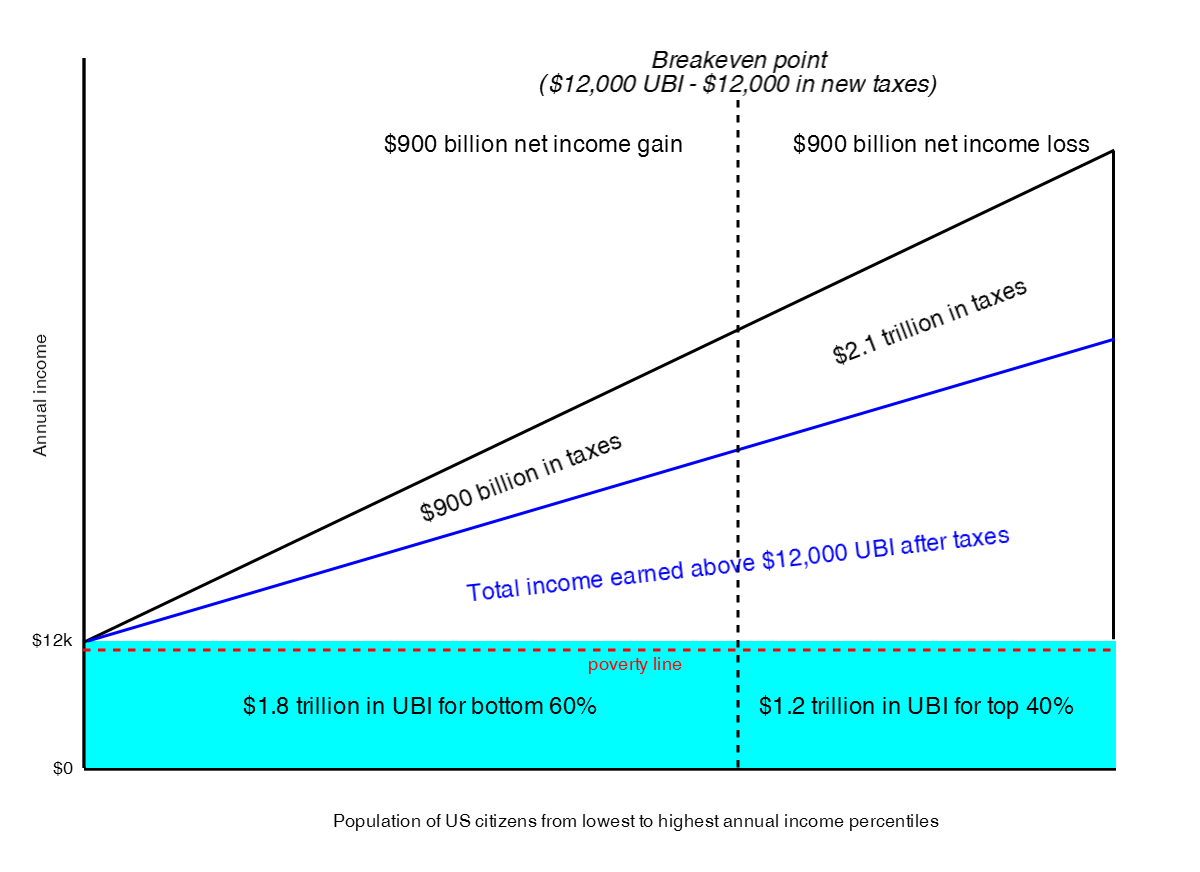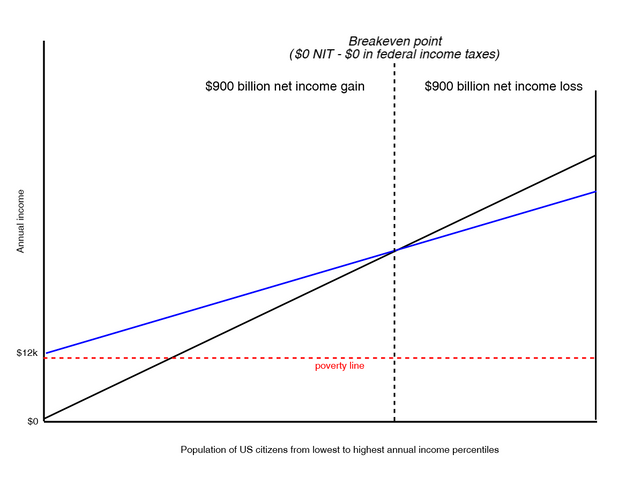The Cost of Universal Basic Income is the Net Transfer Amount, Not the Gross Price Tag
Why every estimate of UBI that simply multiplies the number of recipients by the amount received is simply wrong
Imagine a group of 5 people. They have an income distribution of $10, $20, $30, $50, and $100. Someone gets the BIG idea of everyone putting 40% of their money into a hat, and dividing the result equitably between everyone.
That means $4, $8, $12, $20, and $40 goes into the hat. That's $84 which when divided by 5 is $16.80.
Another way of looking at this result is that the amounts paid were -$12.80, -$8.80, -$4.80, $3.20, and $23.20. The poorest three people paid negative amounts (negative taxation), meaning they received money, and the richest two people paid positive amounts (positive taxation), meaning they lost money.
If we add up the negative amounts and the positive amounts, we see that the poorest three received a total of $26.40, and the richest two lost that same amount. That is the amount of money that physically changed hands, even though everyone put money into the hat, and everyone got money from the hat.
Okay, so here's the question: How much did it cost to make sure everyone received $16.80? Was it $16.80 multiplied by 5, so $84? Or was it $26.40?
The answer is $26.40, which is 31.4% of $84. The true cost is less than one-third the false cost!
This math problem is what's needed to understand the cost of basic income. Every time someone multiplies the number of people receiving basic income by the amount of basic income, they are saying the correct answer to the above math problem is $84, and that is entirely incorrect. They're calculating the false cost. Such a mistake can also lead to assumptions of inflation, which are just as mistaken.
Here's another math problem. What is the cost to provide you $12,000 in basic income if you are asked to pay $12,000 to receive it?
The answer is $0. It carries no cost. If 1,000 people fit the exact same example, the cost is 1,000 x 0, and that's still zero. Multiplying 1 million by 0 is still 0. That's how zero works.
The true cost of basic income is thus the amount of money provided to net receivers, not net payers (who all cost nothing), minus the amount net receivers put into the hat.
I calculate this as around $900 billion in the U.S. (based on $12,000 per adult citizen and $4,000 per child) , and this is true for both a negative income tax (with a 40% clawback rate) and a universal basic income (with a 40% flat tax).


Fun fact: Milton Friedman himself knew UBI and NIT had the same cost.
"A basic or citizen's income is not an alternative to a negative income tax. It is simply another way to introduce a negative income tax if it is accompanied with a positive income tax with no exemption. A basic income of a thousand units with a 20 percent rate on earned income is equivalent to a negative income tax with an exemption of five thousand units and a 20 percent rate below and above five thousand units." - Milton Friedman, 1976 Nobel Memorial Prize Laureate in Economic Sciences
So does Greg Mankiw.
"I have seen smart people argue as follows: Policy A is crazy. Why should Bill Gates get a government transfer? He doesn’t need it, and we would need to raise taxes more to pay for it. Policy B is more progressive. It targets the transfer to those who really need it, and the transfer is financed by a smaller tax increase levied only on those with above-average incomes. But here is the rub: The two policies are equivalent. If you look at the net payment (taxes less transfer), everyone is exactly the same under the two plans. The difference is only a matter of framing.” — Greg Mankiw, Robert M. Beren Professor of Economics at Harvard University
However, for a cost estimate to be even more accurate, we then need to subtract out all the programs replaced by basic income, and all the tax credits replaced by basic income. That total is in the hundreds of billions of dollars range depending on the choices we make, certainly not the $3 trillion gross range or even the $900 billion net transfer range.
Meanwhile the full costs of people not having basic income, aka the costs of not eliminating poverty...?
Yeah, that's well over $3 trillion.
Isn't math fun?!
With the net cost of basic income now understood, here's how I'd fund basic income in the U.S.
Have another question about basic income? Here is a list of links that answers many frequently asked questions.
Like my blog? Please subscribe and also consider making a small monthly pledge of $1 per month via Patreon or Bitcoin, or a one-time donation via PayPal or Bitcoin.
Become a Creator on Patreon and take the BIG Patreon Creator Pledge
Donate to my Basic Income Travel Fund to better enable me to discuss the idea of basic income at important conferences and congresses worldwide
Wear your support for basic income. Get a T-shirt!
Subscribe to my blog | Follow me on Twitter | Like me on Facebook | Follow me on Tumblr

We need more people talking about universal basic income on steemit and less people posting pictures of flowers. Good read.
Haha! I 100% agree with that statement.
Hey Scott. Great article and nice to see you here!
Steemit is a great platform with amazing opportunities, but still has very little awareness. If a couple other big names online start using steemit like you, it could really take off.
Cant wait to see your next article, keep up the good work
Been following you on reddit/ubi stuff for a while now - glad to see you found your way to steem ;)
I joined about a year ago, but just never got around to posting anything until now. ;)
Congratulations @scottsantens! You have completed some achievement on Steemit and have been rewarded with new badge(s) :
Click on any badge to view your own Board of Honor on SteemitBoard.
For more information about SteemitBoard, click here
If you no longer want to receive notifications, reply to this comment with the word
STOPI'm glad to see how quickly you jumped on here! :D I hope you reach all kinds of new audiences by posting here. There might even be a way (in the future) to earn enough from the posts here to then help more people earn towards a basic income!
f'ing brilliant man. Great read. You earned a follow.
Thank you. Cheers!
nice of you to join the steem train
Hey, Scott, welcome to steemit!
Thanks for laying this out.
I think UBI is an interesting concept. Its fascinating to ask oneself what they would do if they encountered a panhandler and knew they had received a check that month.
My question is around use cases. I've heard two, and I would like to know people's opinions in terms of whether or not UBI would be best to serve one, or both.
Use Case 1: UBI can help tackle poverty
Use Case 2: UBI can help tackle future joblessness brought on by automation
Obviously, the required payouts for one versus the other would be vastly different, as would the societal/economic implications.
Thoughts? I am a curious guy looking to learn all he can...THANKS!
The use cases are identical. The issue that seems to block people is thinking of basic income as a replacement for all income. It's not, although it can be if people choose that route. It's primarily an income floor and so it operates as more of a springboard than a traditional safety net where the full universality and lack of conditions better enables people to transition into and out of earned income arrangements.
It's also not something that should exist in a vacuum as the only policy in existence, or in my opinion stay at a poverty level amount forever. I think as automation advances, we should focus on all working fewer hours in order to better share the available work. If there's half as much paid work for humans to do, then we could all work half as much and be just as employed. That also means the entire population could be earning income in addition to their basic income if say 20 hours per week became the norm instead of 40 hours.
In regards to a rising level, I think UBI should be linked to productivity. As we all accomplish more with less thanks to technology, and especially considering the fact that we've as taxpayers paid for the technology replacing us, and trained the algorithms learning to duplicate our work, the amount should increase over time at a higher rate than just inflation.
Here's an article I've written along these lines to get deeper into that.
Thanks for this reply...I'm almost embarrassed to admit it, but I've always seen professional-level employment as sort of a zero-sum thing...one person has a 40-hour job, and one doesn't.
Creates a fun thought exercise. Let's say the average person has UBI in addition to a 20 hour/week job, and with those 2 income streams they have enough to live a perfectly acceptable life.
Would they accept those conditions, or would they look for a second 20-hour/week job?
As an American who has spent time living abroad, one key difference I've found is our general unwillingness to accept complacency...it pushes some of us to greatness, and others of us to an early grave!
Very helpful and informative. I'd made that same mistake myself - although I knew about the savings from replacing expensive means tested social-welfare programs plus the increased incentive to get a job because no UBI is lost.
But Americans (I know we are not the only ones who could benefit - pretty much every country could) are terrible about anything like this. You could explain this to them a dozen different ways and a dozen times and they would not get it. Sigh.
Even with widespread and highly successful rollout of UBI in nations across the world they would still say "tax is theft!" and leave it at that. Never mind if it was costing more to administer the alternative and not including the missed gains for a more equitable wealth distribution. This is exactly the same as single-payer healthcare...doesn't matter if it costs less, works better and is fairer - don't want that, smells like socialism!
Anyway, thanks for a more objective run down of the concept than I can manage :-) Have you seen any actual scenarios examined for the US based on our actual income and tax system?